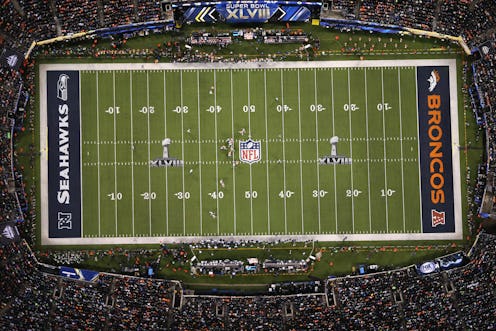News
The NFL Has A Bigger Problem Than Ray Rice
One thing is clear: The NFL has a domestic violence problem, and it isn't going to go away just because Ray Rice has been banished. From the oversight of the Baltimore Ravens, who tried to keep Rice on their team until the very moment it became untenable, to commissioner Roger Goodell, who issued Rice a lax two-game suspension after having a "talk" with him, not to mention the months that the NFL had the violence on tape and denied it, the higher-ups of the league have hardly covered themselves in glory on the issue.
But the problem goes a great deal beyond just Rice and the plight of his victimized wife, Janay (who, it bears mentioning, has been made a public victim all over again by the endless replaying of the video). In the aftermath of this scandal, the NFL has a number of problems on its hands — whether it's appropriate for Goodell to step down, for one, and how to adjust its absurd penalty structure, which punished marijuana and ecstasy use more harshly than a brutal domestic assault. But the problem they should be tackling is this: Why on earth is domestic violence the NFL player's crime of choice?
All credit goes to Benjamin Morris of FiveThirtyEight on this, for putting together numbers that highlight the question sharply. Basically, contrary to the stereotypes you sometimes hear thrown around about the NFL's issues with criminality, the rate of arrests of everyday citizens are a lot higher than they are for those in the league. With one glaring exception.
As you can see on FiveThirtyEight's chart, when compared to the national average, NFL players get arrested less than average citizens in basically every category. But when you hone in on the figures just within the NFL — specifically, what kind of crimes players are most frequently arrested for as compared to normal people — you find something quite grim indeed.
As you can see, domestic violence tops the chart. It's still not as prevalent as it is in non-NFL players by any stretch, but it's the headlining offense, outpacing gun-related arrests, DUIs, and, most tellingly, "all offenses." That's right — while NFL players get arrested just 13 percent of the average for regular folks, they get arrested for domestic violence just over 55 percent of the national average.
Basically, NFL players are unlikely to get arrested, but when they do, it's most likely because they assaulted somebody close to them. Sometimes these assaults can turn deadly. In 2012, Kansas City Chiefs linebacker Jovan Belcher fatally shot his girlfriend Kassandra Perkins, then killed himself at the Chiefs practice facility in full view of the team's general manager.
The NFL is already grappling with two high-profile domestic violence incidents besides Rice's, with Carolina Panthers linebacker Greg Hardy having been found guilty of assaulting his girlfriend in July and making threats against her. He's currently appealing the conviction, but it's unclear whether the Panthers will take action, given the precedent set by Rice being cut by the Ravens — according to ESPN Hardy was absent from the beginning of practice Wednesday, for undisclosed reasons.
Further, the San Francisco 49ers remain embroiled in controversy over their decision to let defensive end Ray McDonald play last Sunday, who was earlier arrested on accusations he assaulted his pregnant fiancé — she showed bruises to the police, who then moved to arrest him. To this point, 49ers CEO Jed York has stood in defense of McDonald, saying the team won't take action against him until all the facts are in.
Each of these cases are grim and serious as isolated events and need to be investigated further, but it's important to remember that no single player fully embodies the NFL's domestic violence problem, not Rice, not Hardy, and not McDonald. Rather, it's time to start taking a broader view and demand accountability from the top — after Belcher's 2012 murder-suicide, Slate's Justin Peters found that 21 of the league's 32 teams had at some point employed a player with a history of domestic or sexual abuse charges.
Images: Getty Images (2); Benjamin Morris/FiveThirtyEight
